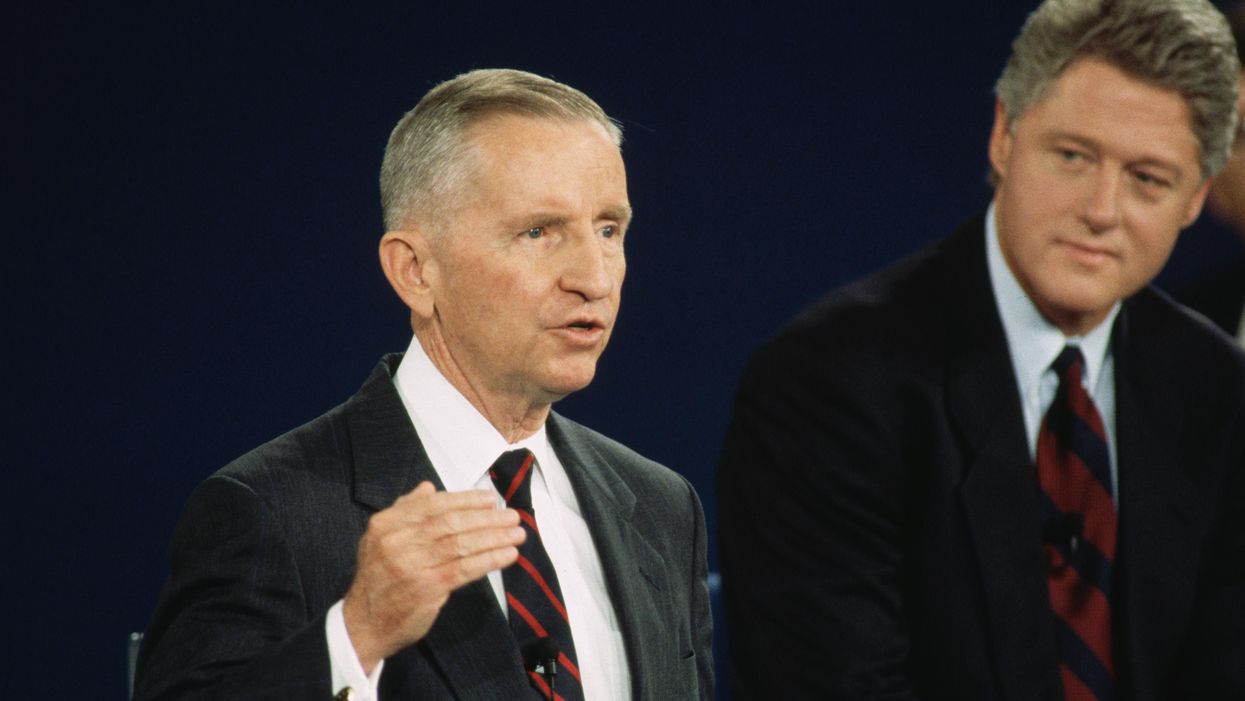Salit is president of Independent Voting, which works to promote the political clout of unaffiliated voters, and the author of "Independents Rising: Outsider Movements, Third Parties, and the Struggle for a Post-Partisan America."
A look in the rearview mirror can reveal a lot. And sometimes objects are closer than they appear.
The year was 1993. Bill Clinton had been elected president with 43 percent of the popular vote. His predecessor, George H.W. Bush, had been turned out of office after one term. And a Texas billionaire with no history in politics or government, Ross Perot, had mesmerized the country with his independent presidential bid and stood on the debate stage with Clinton and Bush, garnering nearly 20 million votes.
The Democratic Party held the White House and a majority in Congress. But the party was worried. Clinton had taken office without a clear majority and his mandate to govern was thin. Internally, the party was restive and divided, echoes of the progressive Jesse Jackson Rainbow movement still reverberating against the party's turn towards Clintonian centrism. Looking to the future – not merely the next election but the prospect of creating a durable electoral majority – the Democratic Leadership Council commissioned a study of the Perot voter. "These voters hold the key to the future of American politics, and there are widespread misconceptions about them," Al From, the president of the DLC, announced at a press conference on July 7, when the results of the study were released.
From argued that the arrival of the independent voter in the mold of the Perot uprising offered a "rare chance to realign U.S. politics around a new Democratic governing majority." What was the profile of these Americans? Will Marshall, the president of the Progressive Policy Institute (which ran the study), had this answer: "The Perot voters don't want centrism, they want change." Further, Marshall observed, "In their view, breaking the gridlock means standing outside the old, polarized debate, offering ideas that break the intellectual gridlock between left and right, and don't simply take sides in that debate." Any strategy to engage with these voters, he said, "has to speak to the deep alienation that these voters feel towards politics as usual, towards the two parties, and towards the government."
These findings must have been conflicting for the DLC. It was promoting a brand of Democratic Party politics built around an idea of centrism, not rebellion or rejection of the status quo. Nonetheless, at the time the DLC urged that Clinton and the Democrats could make sufficient inroads with these voters to buttress his unstable coalition. That would mean grasping a new reality. Stanley Greenberg, who conducted the survey, saw that new reality in stark terms: "I believe we will find [it is] an enduring phenomenon." Greenberg saw "the depth of the alienation of these voters from both political parties, from the political institutions of this country, from the system as a whole, which leaves them estranged from this process, watchful of the process, wanting change, but also deeply, deeply skeptical." Their independence, he said, "is a fact of political life of which all the parties and leaders of this country are going to have to take into account."
Greenberg estimated that roughly half of Perot's 20 million votes came from independents and that the Perot voter was younger than the overall electorate. "They are out here as independents for a reason. They believe [they were] failed by the political process of the past number of decades, and they're looking for something new," he said.
Greenberg searched for deep insight into the mindset of this independent uprising, the "underlying thematic dimensions." Even he seemed surprised by the results. He described Perot voters as "quite libertarian," including that they were identical to Clinton voters on the question of abortion. Perot voters, he said, were "uncomfortable" with the politics of the Republican coalition and disagreed sharply with the positions of the Christian Coalition. They had "strong support for tolerance." Greenberg asserted that these independents were anti-establishment, populist and harboring an emotional dimension that "ordinary people [are] forgotten in the process." Perot voters were "for radically changing government." Political reform, curbing special interests, and restoring public trust were key. They wanted a government that "would act creatively and efficiently to try to help ordinary people."
The DLC leaders had their work cut out for them. Vice President Al Gore's "Re-Invent Government" project was a dismal response, its 384 recommendations failing to touch the "underlying themes" animating the independent voter. Ultimately, though, the Clinton camp knew that their most important aim was defensive. It was to prevent the independent explosion from being able to "congeal into a permanent third force."
Flash forward to 2021. That third force has not congealed in traditional ways, yet. But independents who were 34 percent of the electorate in 1993 and are 41 percent today are deciding important elections from top to bottom. Isn't it time for the Democrats — and the Republicans — to study this history and adjust their playbooks accordingly?



















Trump & Hegseth gave Mark Kelly a huge 2028 gift